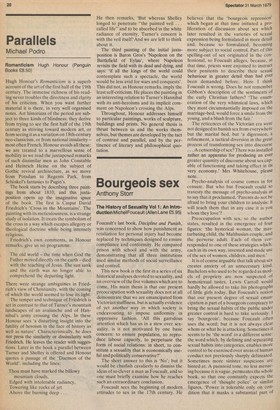Bourgeois sex
Anthony Storr
The History of Sexuality Vol 1: An Introduction Michelfoucault (Men Lane £5.95) Foucault's last book, Discipline and Punish, was concerned to show how punishment as retaliation for personal injury had become replaced by techniques designed to ensure compliance and conformity. He compared prison with school and with the army, demonstrating that all three institutions used similar methods of social surveillance and control.
This new book is the first in a series of six historical analyses devoted to sexuality, and an overview of the five volumes which are to come. His main thesis is that our present preoccupation with sexuality does not at all demonstrate that we are emancipated from Victorian stuffiness, but is actually evidence of yet another way in which society is endeavouring to impose uniformity in oppressive fashion. 'All this garrulous attention which has us in a stew over sexuality, is it not motivated by one basic concern: to ensure population, to reproduce labour capacity, to perpetuate the form of social relations: in short, to constitute a sexuality that is economically useful and politically conservative?'
The short answer to this is 'No'; but it would be churlish cavalierly to dismiss the ideas of so clever a man as Foucault, and so one must briefly examine how he reaches such an extraordinary conclusion.
Foucault sees the beginning of modern attitudes to sex in the 17th century. He believes that the 'bourgeois repressioif which began at that time initiated a proliferation of discussion about sex which later resulted in the varieties of sexual expression being formulated in more detail and, because so formulated, becoming more subject to social control. Part of this spelling-out of sex originated in the con fessional, so Foucault alleges, because, at that time, priests were enjoined to instruct their penitents to describe their sexual behaviour in greater detail than had ever been demanded before. Here I think Foucault is wrong. Does he not remember Gibbon's description of the sentiments of the early Christian fathers? 'The enum eration of the very whimsical laws, which they most circumstantially imposed on the marriage-bed, would force a smile from the young, and a blush from the fair.'
The reticences of the Victorian era were not designed to banish sex from everywhere but the marital bed, but 'a digression, a refinement, a tactical diversion in the great process of transforming sex into discourse . . . A censorship of sex? There was installed rather an apparatus for producing an ever greater quantity of discourse about sex cap able of functioning and taking effect in its very economy.' Mrs Whitehouse, please note.
Psycho-analysis of course comes in for censure. But who but Foucault could so travesty the message of psycho-analysis as to say that it proclaimed, 'Parents do not be afraid to bring your children to analysis: it will teach them that in any case it is you whom they love'?
Preoccupation with sex, so the author states, resulted in the emergence of four figures: 'the hysterical woman, the mas turbating child, the Malthusian couple, and the perverse adult. Each of them cor responded to one of these strategies which, each in its own way, invested and made use of the sex of women, children, and men.'
It is of course arguable that talk about sex creates anxiety of an unnecessary kind.
Bachelors who used to be regarded as mod els of propriety are now suspected of homosexual tastes. Lewis Carroll would hardly be allowed to take his photographs of little girls today. But Foucault's notion that our present degree of sexual eman cipation is part of a bourgeois conspiracy to bring the sexual habits of the public under greater control is hard to take seriously. I say 'bourgeois'. because Foucault often uses the word; but it is not always clear whom or what he is attacking. Sometimes it seems to be 'the word' in a different sense: the word which, by defining and separating sexual habits into categories, enables more control to be exercised over areas of human conduct not previously sharply delineated. Sometimes more sinister suspicions are hinted at. A paranoid tone, no less menac ing because it is vague, permeates the whole book, so that one constantly expects the emergence of 'thought police' or similar figures. 'Power is tolerable only on condition that it masks a substantial part of itself. . . For it, secrecy is not in the nature of an abuse; it is indispensable to its operation.'
I cannot say that I am eagerly awaiting Foucault's next five volumes.







































 Previous page
Previous page